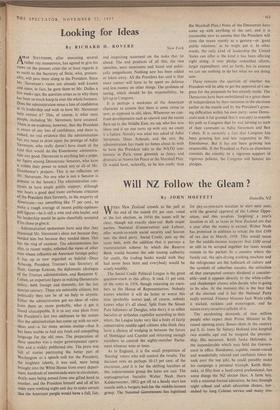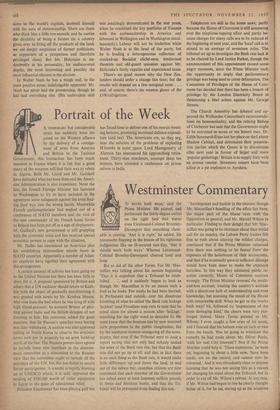Will NZ Follow the Gleam ?
By JOHN MOFFETT Dunedin, NZ WHEN New Zealand crowds to the poll at the end of the month (91 per cent. voted at the last election, in 1954) the issues will be clear, though not exactly clear-cut. Both major parties, National (Conservative) and ,Labour, offer womb-to-tomb social security and heaven too; the third party, Social Credit, puts up the same bids, with the addition that it purveys a transmutation scheme by which- the Reserve Bank would become the sole issuing authority for credit, the trading banks would wish they had never been born and everybody would be wisely wealthy.
The Social Credit Political League is the great question-mark in this affray. It took 11 per cent. of the votes in 1954, though returning no mem- bers to the House of Representatives. Nobody knows whether it will do better or worse this time (probably worse) 'and, of course, nobody knows what it's all about. Split from the Simon Pure followers of Douglas, who decry it as either Socialist or orthodox capitalist according to their whim, the League looks very like a body of fairly conservative middle-aged citizens who think they have a chance of wedging in between the forces of Montague and Capulet and returning enough members to control the eighty-member Parlia- ment whoever wins or loses.
As in England, it is the small proportion of 'floating' voters who will control the results. The decision rests on perhaps 10-15 per cent. of the electorate, and it is for the shifting loyalties of this indeterminate group the lures are cast. The septuagenarian Socialist Walter Nash (born Kidderminster, 1882) got off to a heady start last month with a- bargain- bait for the middle-income group,- The National Government -has legislated for pay-as-you-earn taxation to start next year, with the general approval of the Labour Oppo- sition, and this involves 'forgiving' a year's taxation to all, as taxes in New Zealand are due a year after the money is earned. Walter Nash has promised in addition to rebate the first £100 of tax due in March, 1958. This would mean for the middle-income taxpayer that £100 saved or still to be scraped together for taxes would remain in- his' pocket.. In a country where the family car, the spin-drying washing machine and the refrigerator are _the hallmark of -culture and the symbols of suburban success, the attraction of- that -unexpected 'century dividend is consider- able—and it appeals directly to the white-collar and shopkeeper classes who decide who is going to be who. At the moment this is the best bid of the election and it has the National Party really worried. Finance Minister Jack Watts calls it wicked, reckless and extravagant, and he means everyinvective syllable of it.
The unrelenting demands of two million people who expect their Prime Minister to fly round opening every flower show in the country put S. G. (now Sir Sidney) Holland into hospital two months ago and he resigned the premier- ship. His successor, Keith Jacka Holyoake, is the imponderable which may hold the Govern- ment in office. Handsome, capable, round-voiced and wonderfully relaxed and confident (since he took over the top job), he could possibly make his campaign a personal triumph. Keith Holy- oake, at fifty-four a hard-cored professional, has some things the NZ elector likes. A farm boy. with a minimal formal education, he has, through night school and adult education classes, bur- -nished by long Cabinet. service. -and many mis- sions to the world's capitals, invested himself with the aura of statesmanship. There are those who think him a little too smooth, and he carries the disability of being a farmer (in a country given over to living off the products of the land, we are deeply suspicious of farmer politicians, as supporters of a prosperous and therefore privileged class). But Mr. Holyoake is un- doubtedly in his personality, his undiscovered depths, the most interesting and possibly the most influential element in the election.
In Walter Nash he has a tough and, in the most positive sense, indefatigable opponent. Mr. Nash has never had the premiership, though he has had everything else. (His ambivalent skill was amazingly demonstrated in the war years, when he combined the key portfolio of Finance with the ambassadorship in America and laboured in Wellington and in Washington simul- taneously.) Labour will not be leaderless while Walter Nash is at the head of the party, but he is leading a heterogeneous collection of cracked-up Socialist cliche-men, intellectual theorists and old-guard unionists against Mr. Holyoake's fairly capable and experienced team.
There's no good reason why the New Zea- landers should order a change this time; but the results will depend on a few marginal seats . . . and, of course, there's the wanton gleam of the 100 refrigerator.











































































 Previous page
Previous page